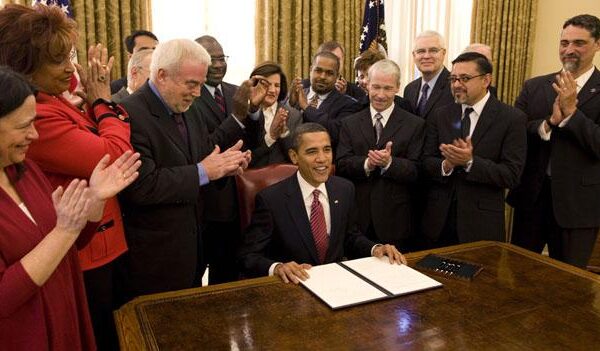Many have forgotten about the faith-based initiative by now. The once contentious and controversial set of policy initiatives, created by the conservative evangelical movement with the purported goal of encouraging religious organizations to take government funds to do social services, has now become part of our public policy fabric. The initiative briefly made it back to the headlines when the head of the White House’s Faith-Based Office, Joshua Dubois, an African American Pentecostal minister resigned, but it was barely a blip. This is perhaps what makes the faith-based initiative so remarkable. It has so transformed our understanding of how religion and government should operate, as officially institutionalized partners, that it is now almost totally unremarkable.
Begun in Texas by then Governor George Bush, the faith-based initiative like other originally conservative policy ideas such as drone warfare, warrantless wiretapping, and mandated private health insurance, has become deeply entrenched in many aspects of our government. There are faith-based offices operating in over 30 states, every major city, many branches of federal government (even Homeland Security), and there is still a White House Office of Faith-Based and Community Partnerships. Much like normalization of other public policies such as school vouchers, the policies created under the faith-based initiative have created an unprecedented level of religious entanglement within the government. These various initiatives to increase the presence of religion within government would have been unthinkable 20 years ago.
In fact, much to the outrage of church/state separation advocates, the initiative has actually expanded in some ways under President Obama — from 13 to 15 federal agencies and the from 30 to 45 White House Faith-based Office employees. And President Obama has still not set aside the rule allowing religious groups to hire whomever they want even if they take government money to do it. Yes, that’s right, religious organizations receiving government grants are free to discriminate when they hire new employees. Â
In his farewell to the office, Dubois wrote an article on CNN. He argued that he and the other faith leaders “care first about God, and second about their neighbors.” This type of statement reinforces what many Americans feared about the entanglement of religion into government by the faith-based initiative, that it would make religion first, and creating a better social service system second. It is also most likely at least part of the reason why many Americans have lost their faith in religion. For the progressive religious leaders I have been speaking with over the last four years on my new project examining the religious left, this vision is not one that they agree with and not one that is likely bring back to the fold the ever growing population of religious “nones.”
What President Obama will do next is anyone’s guess. With his “Pastor in Chief” gone, he has a real opportunity to make the successor less known for his daily prayer tweets, and more known for encouraging and creating social policies that help the least, last and lost. With his second term and second director, Obama can move beyond changing the name of his faith-based office, to changing the way people perceive the role of religion and government in the United States, one that puts people first, regardless of their relationship with, or without, God.
Rebecca Sager is a guest contributor with the USC Center for Religion and Civic Culture.








